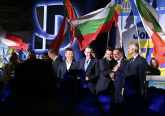It was a matter of “religious freedom” – following a request from Serbia, Hungary’s veto on the sanctioning of Patriarch Kirill would have been expected. It was one of the interesting takeaways from of a few days spent in the company of pro-Fidesz politicians, pastors, and public intellectuals at the Tusványos summer festival. Gathered in the heart of Romania – home to a sizeable minority of ethnic Hungarians, about 6 per cent of the population – it struck me that Orbán’s story is not just a story of Hungary. It is a story of the region, of Europe, and of Hungary’s place in the world.
A new story about Hungary
When Orbán came to power for the second time in 2010, he quickly put the nation “under construction”. The powers of the Constitutional Court were curtailed, his loyalists were appointed to key positions in political and civil institutions, the constitution was revised, the tone towards Europe became more aggressive, corruption soared, the main churches were patronised, universities lost their full academic independence, and museums were populated with “edited histories”.
Visitors to Budapest are told about the holy crown of St. Stephen, the suffering of the Hungarian nation under the yoke of history, and the rebuilding of the nation as the bearer of European Christianity. From the Terror House to the Parliament, from the new WWII-memorial on Liberty Square to the freshly restored St. Stephen’s Hall – the message is that Hungary is back: back as a nation and back as a major player in Europe.
Similarly, the visitor can see the counter-monument opposite the WWII memorial. While the official monument is silent about Hungary’s complicity in the murder of Hungarian Jews, the counter-monument shows artefacts of the Holocaust: bags, shoes, pictures, and a warning about the falsification of history before our eyes. Translated into several languages, the message is aimed at tourists.
The ideology of the current government rests on several nodal points: Christianity versus secularism, traditional values versus liberalism, ethnic Hungarians versus ethnic others, and East versus West. It is often at the intersection of these that othering hits hardest: as in the case of Soros, who could be portrayed as non-Hungarian, Jewish, secular and liberal. However, these contrasts have different meanings for the country and for the international aspirations of the current government – the distinction between which is not always clear.
The interest in religious freedom serves the international Christianist agenda and can count on the support of religious traditionalists around the world, especially in the US. It supports the agenda of those who “defend” traditional Christian institutions against the demands of secular society. Allegedly, religious freedom inspired Orbán to issue a veto to the sanctioning of Patriarch Kirill.
Within Hungary, however, churches have been pressured into Fidesz-friendly positions: their status as a church and their access to government funding depend on their support for Fidesz. Churches literally come to Parliament begging, and some are sent away empty-handed, such as the Methodists led by Gábor Iványi, whom Orbán treats as a personal enemy, and who are threatened with closure.
The churches that have been granted full status tend to be those that Orbán needs: such as the Catholic and Reformed churches, some Jewish congregations, and, for diplomatic reasons, the Russian Orthodox Church – a tiny community now led by Hilarion Alfeyev, the former foreign envoy of the Moscow Patriarchate. Although it is extremely difficult to criticise Fidesz or Orbán from within the churches, the saga surrounding the resignation of President Katalin Novák and the alleged complicity of the Reformed Primate Balog seems to be creating space for grassroots criticism of both religious and political leaders.
Hungary in the region
Orbán also tells a different story about the role of Hungary in the region, where ethnic communities have lived side by side for centuries. Ethnic Hungarian communities in neighbouring states are important to Fidesz in projecting the self-consciousness of Hungarians as one nation. Sometimes this is about preserving certain traditions, customs or language, in which political references to “Trianon” – the treaty that recalibrated some of the borders in the aftermath of the Habsburg empire – abound. In far-right circles, “Trianon” signifies a sense of “loss”, as much as it meant the independence of other states, like Romania, and is in fact regarded with disdain among the Hungarian opposition.
“Trianon” has a mobilising power in both right-wing and extreme-right circles, such as those who gathered for the European Far-Right Fight Night in Csókakő last year, where a large monument commemorates both “Trianon” and the WWII-governor Milklós Horty. This Hungarian yet transnational phenomenon was on full display at a summer market in Debrecen, where one could buy Hitler paraphernalia alongside the Transylvanian, Russian, and Confederate flags, as well as a 1930s Imperial German Flag (often used by neo-Nazis). Orbán’s engagement with the idea of Greater Hungary has contributed to the mainstreaming of extreme-right ideas in his own country, which helps him to contain the electoral threat posed by Jobbik, but which also means that the boundaries between right-wing and extreme-right positions are vague at best.
“Trianon” is a powerful vehicle for Orbán in the region, as ethnic Hungarian communities beyond-the-border are also the road into foreign governments: ethnic Hungarians can vote in Hungarian elections (and help solidify the two-third majority that Orbán holds), but also in elections in the country of actual citizenship or residence: this includes Croatia, Serbia, Romania, Ukraine, Slovakia, Slovenia – and in some of these countries, the “Hungarian” parties are key to cabinet formation. I have heard several Serbs complain that their president “talks more to Orbán than to Serbian ministers”, but this is no mere sign of power: Orbán has become more isolated and is himself in need of political allies in Europe.
At Tusványos, delegates from these Hungarian political movements abroad alluded to the transactional nature of this cooperation: they expected Orbán to continue to support them in the future. Orbán himself spoke about the idea of a “Hungarian World”, echoing the notion of the Russkii Mir just months after the full-scale invasion of Ukraine. This Hungarian World would be the “defender” of Christian values and of Christian Europe against the corrupt and evil West.
Echoing the binary of good and evil we had just heard from Patriarch Kirill, several religious leaders, including Christian bishops spoke of the “evil” of the West. Mobilising issues such as gender, sexuality, migration, and secularism are but proxies for a deeper frustration with Hungary’s peripheral status in Europe and the world. This is about political significance, prosperity, and maintaining something distinctive amidst the pressures of liberalism, capitalism, and the growing tensions between Europe and Russia.
Hungary in Europe, East vs. West, and the special path in the Russo-Ukrainian war
This anti-Western logic has also informed Orbán’s ambivalent attitude to the Russo-Ukrainian war, which he has labelled as a “Slavic war” in which “no Hungarian blood should be shed”. At Tusványos, he claimed to be negotiating with President Zelensky to exempt ethnic Hungarians from conscription in Ukraine. He remarked that tensions between the West and Russia tended to result in missiles flying over their backyard, and that this was not in the interests of the region bordering Russia. But if this were true, why did Poland strongly support Ukraine from the beginning of the invasion? Why did the Polish government not echo Orbán’s stance?
It was interesting to see Hungarian officials travelling to Moscow for energy negotiations – as well as to China – well into the war, signalling a significant energy dependence on Russia. While most of Europe has poured money into reducing dependence on Russia, Hungary’s cheap energy prices underpin part of Orbán’s popularity: he cannot afford to spend more money on energy, nor can he afford to irritate Russia. This dependence seemed to be on display during his meeting with Putin in China last year. Perhaps this dependency is more significant than many make it out to be.
He also took aim at the European Union for withholding the Covid-recovery funds, visibly nervous about the prospect of having to raise energy prices. For years, Orbán’s illiberalism has been met with political pressure from Brussels. By attaching rule-of-law conditions to EU funds, the EU thinks it can put Hungary back on the democratic path, but this may be a fallacy. Orbán has entrenched his illiberalism throughout Hungarian society and is profiting from the many crises facing Europe. In dealing with them, Europe seems to need Hungary more than Hungary needs Europe.
Orbán desperately needs the once-frozen billions from the EU. The release of EU funds to Hungary in the context of the $54 billion EU aid package to Ukraine, which Hungary temporarily blocked, shows that Europe does not always have the upper hand in this relationship. When Hungary assumes the presidency of the Council of the European Union in July 2024, it will have further opportunities to shape the balance of power between Brussels and Budapest. But it could also bring some of its own dependencies on Russia into the presidency of the Council – including in using its agenda-setting powers – and that could potentially damage the EU even more.
Recently, Orbán has suggested that Hungary’s future is not necessarily tied to Europe, but to Hungary’s ability to strike special agreements with the world’s major powers, Russia, China and the US. He is counting on the return of Trump as US president. While it is unlikely that Orbán will get a return on all of this, it is worrying that his administration will oversee the Council presidency, especially in a super election year.
Meanwhile, he is taking an interest in the fate of populists in other European countries. Orbán sent political advisors to support Fico in the Slovak elections and similarly, there were reports of Hungarian advisors supporting Law and Justice in the most recent Polish elections. One wonders whether similar support was offered in the recent Dutch elections, which were won by a long-time ally Geert Wilders, and where else such support might be directed. Orbán heralded Wilders’ victory as the start of a new populist wave in Europe.
In the academic sphere, Orbán’s tool for exporting his worldview is the Mathias Corvinus Collegium – a para-academic institution offering educational activities in the spirit of Fidesz. The institution has been endowed with eye-watering sums of money and is designed to train the emerging Fidesz elite, while at the same time engaging in international networking by inviting (small-c) conservative scholars from European and Anglo-American backgrounds to its events to bolster its academic credibility. It demonstrates an ideological and programmatic approach to the preservation and reproduction of Fidesz’ interests, signalling that its ideas are here to stay.
Although Hungary is a small country, Orbán has shown himself to be adept at putting himself on the map – not only within Hungary, but also across the region and Europe, while reaching out to the world’s major powers. But while he may be the king in his own chess game, he is a much smaller piece in the chess games of the likes of Putin, Trump and Xi Jinping – and the question is not whether this will hurt the EU, but to what extent.
Note: This article reflects the views of the author and not the position of the DPIR or the University of Oxford.






